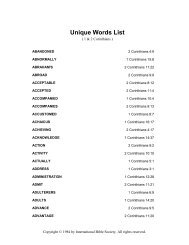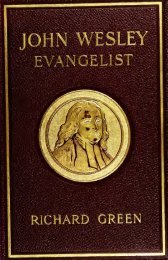FREE METHODIST YOUTH - Bible Quizzing - Study Tips & Resources
FREE METHODIST YOUTH - Bible Quizzing - Study Tips & Resources
FREE METHODIST YOUTH - Bible Quizzing - Study Tips & Resources
Create successful ePaper yourself
Turn your PDF publications into a flip-book with our unique Google optimized e-Paper software.
(91) All questions must be based on the announced book(s) of study for that quiz season. No question may be askedwhich requires a background of general <strong>Bible</strong> knowledge or depends on any other outside source for its comprehension.(92) Only verses contained in the Official List of Quotes for that quiz year may be used as tournament quotes.(93) If an exact quote is expected for an answer, the word “quote” must be included in the question. If the questionsays “give,” “state,” or “indicate,” it does not call for an exact quote. The quizmaster must designate in advance of thequestion that a quote is required.(94) Questions should not be asked which require yes/no, or true/false answers.(95) If there are any possible parallel passages from the quiz books being studied which deal with the same subjectmatter of a particular question, the question should be labeled “cross-chapter” or “cross-book” and all answers must begiven for correctness.(96) Book names, chapter numbers, and key words or phrases may be used to limit the scope of an answer, but versereferences may not be used for this purpose unless they are among those listed on the Official List of Quotes.(97) All questions should be directed toward what the <strong>Bible</strong> says, not what it means. Interchanging pronouns withproper names and stating other simple variations of the text are acceptable, but questions involving interpretation beyondthe obvious implications of the text are not permitted.(98) Every question must be complete in itself. It should not depend upon a previous question or answer for any information.(99) All questions must be worded so that their meaning is clear.(100) The quizmaster must notify quizzers of the “question type” in advance of the following types of questions: thosewith two or more parts; those beginning with a statement followed by a question; “cross-chapter” which require informationfrom more than one of the current quiz chapters; those “cross-book” questions which require information from morethan one of the current quiz books; and “Quote” questions. This notification should be given in advance of the “legal introduction.”(101) A question has two parts if:- There are two subjects with one verb.- There are two verbs with one subject.- There are two question words.- There are two parts (objects) in a key prepositional phrase.- There is a divided predicate (two objects of the verb).Note: If the answer is single and it involves both parts, the words “both ... and” may be used to eliminate the twoparts. Questions that ask for comparisons or relationships between objects are not two parts because these wordsconnote two parts.- A quote involving more than one of the stated verse(s) references given on the Official List of Quotes.(102) A question has three parts if:- There is a two part question followed by a one part question.- There are three question words in the question with single subjects and objects.- There are three subjects with one verb.- There are three direct objects with one subject and one verb.- There is one subject with three verbs.(103) A question has four parts if:- It has four question words.- It has a two part subject and a two part verb.(104) A question shall be considered as a “legal” tournament question only if it meets the preceding requirements.Any question which does not meet these guidelines may be appealed. (See Appeal of the Question J-2.)





